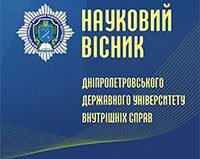Alina CHORNA
CHORNA A. (2023), PRINCIPLES OF PREVENTION OF CRIMINAL OFFENSES BY THE POLICE IN THE DE-OCCUPIED TERRITORIES; Scientific Bulletin of Dnipropetrovsk State University of Internal Affairs, № 2, 43-47
DOI: 10.31733/2078-3566-2023-2-43-47
ABSTRACT. The study examines the issues of disclosure in scientific literature and normative legal consolidation of the concept and content of the principles of prevention of criminal offenses by the police in the de-occupied territories. It is emphasized that as a result of the full-scale aggression of Russian troops on the territory of Ukraine in the territories liberated from the occupiers, the police are forced to act under special conditions caused by the state of war and the consequences of hostilities and occupation. Some categorical questions regarding the concept of «principle», «legal principle» and the concept of the principles of the National Police of Ukraine are considered. The normatively determined general principles on which all the activities of the National Police of Ukraine are built (rule of law, legality, interaction with the population on the basis of partnership, etc.) are considered.
The opinions of researchers regarding the principles of crime prevention as derived from the general principles of police activity are given. The researchers’ statements on the content of the concept of the principles of preventive activity of the National Police of Ukraine, features of the principles of preventive police activity, which include the prevention of criminal offenses, are also considered. We are talking about the classification of such principles. The definition of the principles of the prevention of criminal offenses in the de-occupied territories is revealed as fundamental and basic ideas, general and fundamental normatively defined (and embodied in the legislation) principles of the activity of the National Police of Ukraine, its authorized persons and structural units, in such a field of preventive activity as the prevention of criminal offenses in the territories that were de-occupied and in which the process of normalization of life is taking place.
Among the peculiarities of the principles of prevention of criminal offenses in the de-occupied territories, it is noted, for example, if among the general principles the researchers single out the principle of demilitarization of the police, but in the conditions of martial law, the adjacency of the de-occupied territories to the combat zone, the principle of police work under special conditions should be taken into account; the principle of interaction of the police with other subjects of the security and defense sector in conditions close to combat operations, etc.
Keywords: special conditions of service, martial law, principles of activity, prevention, classification.
- References:
- Ishchenko, I. V. (2022) Pryntsypy preventyvnoi diialnosti Natsionalnoi politsii Ukrainy: znachennia ta osoblyvosti [Principles of preventive activity of the National Police of Ukraine: significance and features]. Pravo ta derzhavne upravlinnia. № 4. рр. 79–84. [in Ukr.].
- Karbovskyi, D. (2020) Pryntsypy administratyvnoi diialnosti terytorialnykh orhaniv Natsionalnoi politsii Ukrainy [Principles of administrative activity of territorial bodies of the National Police of Ukraine]. Pidpryiemnytstvo, hospodarstvo i pravo. № 4. рр. 153–157. [in Ukr.].
- Kyrychenko, O. V., Khmelenko, V. V. (2020) Pryntsypy operatyvno-rozshukovoho zapobihannia zlochynam [Principles of operational and investigative crime prevention] : monohrafiia. Kyiv : Tsentr uchbovoi literatury, 2020. 160 р. [in Ukr.].
- Korohod, S. (2022) Pidstavy ta pryntsypy kryminalizatsii umysnoho vbyvstva, poiednanoho iz zghvaltuvanniam abo seksualnym nasylstvom [Grounds and principles of criminalization of intentional murder combined with rape or sexual violence]. Naukovyi visnyk Dnipropetrovskoho derzhavnoho universytetu vnutrishnikh sprav. №.4. рр. 411–418. [in Ukr.].
- Pryimachenko, D. V. (2007) Administratyvna diialnist mytnykh orhaniv u sferi realizatsii mytnoi polityky derzhavy [Administrative activity of customs bodies in the sphere of implementation of the customs policy of the state] : dys. … d-ra yuryd. nauk : 12.00.07. Dnipropetrovsk. 469 р. [in Ukr.].
- Pro Natsionalnu bezpeku Ukrainy [On National Security of Ukraine] : Zakon Ukrainy vid 21.06.2018. URL: https://zakon.rada.gov.ua/laws/show/2469-19#Text. [in Ukr.].
- Pukhtetska, A. (2006) Yevropeiski pryntsypy administratyvnoho prava: poniattia i systema [European principles of administrative law: concept and system]. Pravo Ukrainy. № 10. рр. 15–19. [in Ukr.].
- Repelo, V. V. (2021) Administratyvno-pravovi zasady diialnosti Derzhavnoi mihratsiinoi sluzhby Ukrainy [Administrative and legal principles of the State Migration Service of Ukraine] : dys. … d-ra filosofii : 081 «Pravo» / Dnipropetrovskyi derzhavnyi universytet vnutrishnikh sprav. Dnipro. 260 р. [in Ukr.].
- Shatrava, S. O., Parkhanov, H. R. (2019) Pryntsypy preventyvnoi politseiskoi diialnosti: poniattia, zmist ta yikh klasyfikatsiia [Principles of preventive police activity: concepts, content and their classification]. Pravo i bezpeka. № 3(74), рр. 41–47. URL: https://heinonline.org/HOL/LandingPage?handle=hein.journals/lwsfkhv2019&div=50&id=&page=. [in Ukr.].
- Shevchuk, H. (2019) Pryntsypy ta zavdannia diialnosti Natsionalnoi politsii Ukrainy [Principles and tasks of the National Police of Ukraine]. Pidpryiemnytstvo, hospodarstvo i pravo. № 7. рр. 120–124. URL: http://pgp-journal.kiev.ua/archive/2019/7/22.pdf. [in Ukr.].
- Shylo, Ye. P. (2018) Pravovi pryntsypy diialnosti Natsionalnoi politsii Ukrainy [Legal principles of the National Police of Ukraine]. Aktualni problemy vitchyznianoi yurysprudentsii. № 6. Vol. 2. рр. 154–164. [in Ukr.].
- Iurydychna entsyklopediia [Legal encyclopedia] : v 6 t. / redkol. : Yu. S. Shemshuchenko (holova redkol.) ta in. Kyiv : Vyd-vo «Ukrainska entsyklopediia» im. M.P. Bazhana, 1998. Vol. 5. 2003. 736 р. [in Ukr.].
